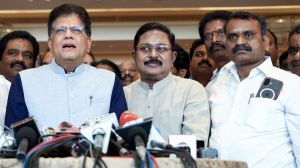US softens stand on Musharraf
WASHINGTON, OCT 18: Except for expressing disappointment that Pakistani military leader Gen Pervez Musharraf had not outlined a timetable...

WASHINGTON, OCT 18: Except for expressing disappointment that Pakistani military leader Gen Pervez Musharraf had not outlined a timetable for return to civilian rule, the Clinton administration has responded positively to a raft of proposals he has made in a speech on Sunday and virtually legitimised his rule for the time being.
Specifically, Washington has welcomed the military ruler8217;s move to withdraw troops from some border areas with India; his promise of restraint in nuclear matters; and his sober views on Afghanistan and Islamic extremism. Reacting more readily than New Delhi to his overtures towards India, State Department spokesman James Rubin welcomed the General8217;s commitment to dialogue with India and the unilateral announcement of troop withdrawal from some border areas.
Significantly, the US pressed for an expanded troop withdrawal program and other confidence-building measures CBMs on Pakistan8217;s part. 8220;We hope that this move could be expanded including forces along the Line of Control inKashmir and urge Pakistan to undertake other CBMs measures that could lead to a lessening of tensions with India,8221; Rubin said in a statement faxed to journalists on Sunday, hours after Musharraf8217;s speech.
The administration is also heartened by Musharraf8217;s remarks about religious extremism and intolerance in his country. There is also surprise here at the general8217;s agreement with the American line that the Afghan conflict could be settled only through a representative government in Kabul.
Both statements 8212; as also his unilateral troop withdrawal pledge 8212; belie the impression in some circles that Musharraf is a hardliner who is close to the Taliban and is a hawk on India who initiated the Kargil incursion. On the other hand, the pledges could also be an indication of how much Washington has managed to stamp its views on the new regime in Islamabad.
The only expression of disappointment in an otherwise laudatory statement came vis-a-vis the general fudging on the return to democracy timetable, but eventhat chagrin appeared to be token.
8220;Because we do not believe military takeovers are the appropriate method for resolving the problems that face democracies, we welcome his pledge to work for a return to democracy and his promise that the armed forces would not stay in charge any longer than necessary. At the same time, we are disappointed that he did not offer a clear timetable for the early restoration of constitutional, civilian and democratic government. We call upon him to do so now,8221; Rubin said.
US officials made it very clear that the Musharraf regime would be under close scrutiny from Washington. 8220;The United States will watch closely as the General acts to fulfill his pledge to return his country to democracy and to address other serious problems he identified, including the economy and corruption8230;While this process proceeds, our own actions toward Pakistan in the days ahead will be guided by the steps taken by the new authorities,8221; Rubin added.
In sharp contrast to Washington8217;s phlegmaticreaction, the European Union and Commonwealth have taken a much tougher line. The EU has set a November 15 deadline for Pakistan8217;s return to civilian rule before it takes punitive action. The Commonwealth is considering a similar deadline before it expels Islamabad from the body.
- 01
- 02
- 03
- 04
- 05






























